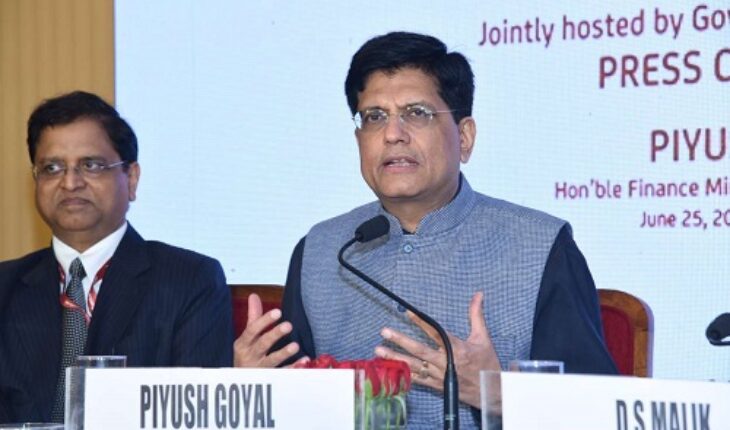India is looking forward to investments in 9 more projects from Asian Infrastructure Investment Bank after having picked up almost 28% of the bank’s total lending so far of US$1.4 billion for 7 projects, Union Minister for Finance, Piyush Goyal told media during the Third Annual Meeting of the AIIB that kicked off today.
Welcoming delegates from 86 countries, the Minister pointed out that in just three short years, India has hosted three major events for international multilateral banks; the New Development Bank (NDB), African Development Bank (ADB) and now the Asian Infrastructure Investment Bank (AIIB) in quick succession.
Lauding AIIB for its robust processes, Goyal said, “It is a matter of great pride that a concept floated in 2014 was able to mature in 6-7 months, and by 2015 we had a Multilateral Development Bank in place with India being the second largest stakeholder with over 8% stake. AIIB has focused its investment in India on lending to rural infrastructure, energy and power, environmental protection, transportation and telecommunication, water supply and sanitation and urban development and logistics, and it is a matter of great pride that India is the largest recipient of the $4.2 billion funds disbursed by it.”
Attributing robust framework and easy-to-navigate policies being the key reasons for the investment flow into infrastructure in the country, the Minister said,” India is a sweet spot where the rule of law prevails to attract investments.”
Earlier, participating in the panel discussion on ‘Mobilizing Finance for Infrastructure’, the Minister said that integrity of people and process would decide the investment discourse. Mumbai as a city has improved its ranking in Swachhta Index significantly during the last few years and is engaging with international global efforts for better quality of life, he said, adding that by 2022, the government as part of Prime Minister’s plan will ensure every citizen has shelter, 24×7 electricity, good toilet, clean drinking water, access by road to his house and internet connectivity.
Elaborating on measures like GST taken by the Central Government in collaboration with state governments to boost the spirit of cooperative federalism, he also detailed the Government’s efforts regarding implementation of recommendations of the 14th Finance Commission, and noted that the Ayushman Bharat program would be launched soon to provide free medical coverage, of up to $8000 per year, to over 500 million people in the country.
Maharashtra Chief Minister Devendra Fadnavis highlighted his government’s vision to become a US$1 trillion sub-national economy by 2025 and to align it with the country’s plan to be a US$5 trillion economy. To combat climate change, the Maharashtra Government introduced major policy shifts focusing on urban infrastructure, clean energy, bio-diversity conservation, eliminating hunger and universal access to water, besides lining up several infrastructure projects with AIIB, he said.
Sushil Kumar Modi, Deputy Chief Minister of Bihar, highlighted the infrastructure developments and investments in Bihar, during the last 10 years. Showcasing the milestones, he spoke about the improved air and road connectivity with a total investment of Rs. 1,19,000 crore for road infrastructure, in the past decade.
Highlighting growth in tourism including increased international travellers, demand for village tourism, enhanced rail, air and road connectivity, Trivendra Singh Rawat, Chief Minister of Uttarakhand, said that being provider of cheapest electricity in India, Uttarakhand enjoyed 24-hours electricity yearly. He also detailed the River Rejuvenation Project that provides the state with year-long continuous water suppl, besides his government’s plans to establish “Medi-city”, an ayurvedic medical centre and an international convention centre in Rishikesh.
Meanwhile, for the first time, the Asian Infrastructure Investment Bank (AIIB) and the Islamic Development Bank Group (IsDB Group) signed a Memorandum of Understanding (MOU) to establish a framework for strategic cooperation, including actively seeking to co-finance projects in common areas of operations. The overarching theme of the MOU will be “Mobilizing Financing for Infrastructure: Innovation & Collaboration”.
Signed during AIIB’s Third Annual Meeting in Mumbai, the MOU deepens the relationship between the two banks, allowing them to foster collaboration, share information and facilitate knowledge exchanges on development finance, Islamic finance and integrity mechanisms. The MOU will have a strong focus on sustainable infrastructure including development of energy and power, transportation and telecommunications, rural infrastructure water supply and sanitation, environmental protection, urban development and logistics.
“An agreement between our banks is a natural fit because we are both dedicated to development and helping our members promote growth and economic opportunity,” said AIIB President Jin Liqun. “We have complementary skill sets and expertise. We believe working together on joint investments and initiatives will strengthen our capacity to deliver on our respective missions and benefit our members.”
“We have a number of common member countries in Asia and also in Africa and a significant overlap in sectors and financing activities,” said IsDB Group President H.E Dr. Bandar M.H. Hajjar. “IsDB Group looks forward to jointly strengthening the effectiveness and sustainability of our banks’ operations and to looking for new ways to stimulate the region’s economic growth together. We strongly believe in the power of innovation, science and technology to stimulate growth and will ensure this is a key area of collaboration for the banks going forward.”






